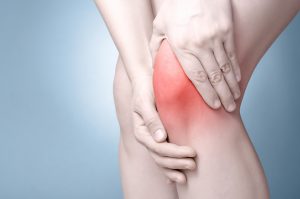When you walk up the stairs does it sound like popcorn popping? Do you feel swelling in those joints after extended movement or climbing up and down stairs? Snapping, cracking, or popping sounds in your knees may be an early sign of arthritis.
Arthritis is an informal way of referring to joint pain or disease. Common symptoms of the  condition include:
condition include:
- pain
- swelling
- stiffness
- decreased range of motion
Symptoms of such joint pain may come and go, but if untreated may worsen over time. Severe arthritis may cause permanent joint damage, chronic pain, and may make mobility painful and difficult. Therefore, it is important to treat joint pain as soon as you discover symptoms, no matter how mild they may seem.
A recent study in the journal Arthritis Care & Research looked at 3500 adults ranging in age from 45 to 79 years old and at risk for joint disease. The study found that those middle to older aged adults who heard cracking in their knees often were likely to develop arthritis in the next year. For example, those that reported hearing their knee crackle “sometimes” or “often” were nearly twice as likely to develop arthritis in the next year as those who reported “never” (8% vs. 4.5%). Furthermore, those who reported hearing their knees crackle “always” were nearly three times more likely to develop the condition in the next year as compared to those who reported “never” (11% vs. 4.5%).
How to Treat Joint Pain
Be sure to visit your healthcare provider if you experience joint pain. Not only can they provide medications that may help to relieve pain, but they may also be able to take x-rays and blood tests that could check to see if you may have arthritis.
Other ways you can treat joint pain include:
- Gentle stretching exercises
- Warm shower
- Ice packs in the sore area
- Resting the sore joint
Maintaining a healthy weight by staying active and eating healthy can also reduce joint pain. A joint-healthy diet contains plenty of calcium-rich foods such as milk, yogurt, and other low-fat dairy products as well as leafy green veggies like spinach and kale. Other vitamins and nutrients may also help with the prevention and treatment of joint pain such as the following:
- Omega-3 fatty acids such as those found in fatty fish, plant-based oils, olives, nuts, and seeds have been found to reduce inflammation in those people who experience joint pain.
- Glucosamine, a supplement made from the shells of crustaceans such as lobster, crab and shrimp, has been found to decrease joint pain and stiffness.
- Capsaicin, such as that found in some analgesics, has been found to help rub out mild joint pain.
- Osteovent by Vita Sciences contains a combination of joint-healthy supplements such as vitamin D, calcium, magnesium, vitamin K, and boron that have been shown to promote strong bones.
You can also visit the Arthritis Foundation website for more information on joint pain research, treatment, and prevention. 
-written by Staci Gulbin, MS, MEd, RD, LDN
Sources:
Arthritis Foundation (accessed May 14, 2017) “What is Arthritis?” & “51 Ways to Be Good to Your Joints” http://www.arthritis.org/
Medline Plus (May 5, 2017) “Do Your Knees Crackle and Pop?” https://medlineplus.gov/news/fullstory_165268.html
NIAMS (July 2014) “Living with Arthritis: Health Information Basics for You and Your Family” https://www.niams.nih.gov/Health_Info/Arthritis/default.asp#d